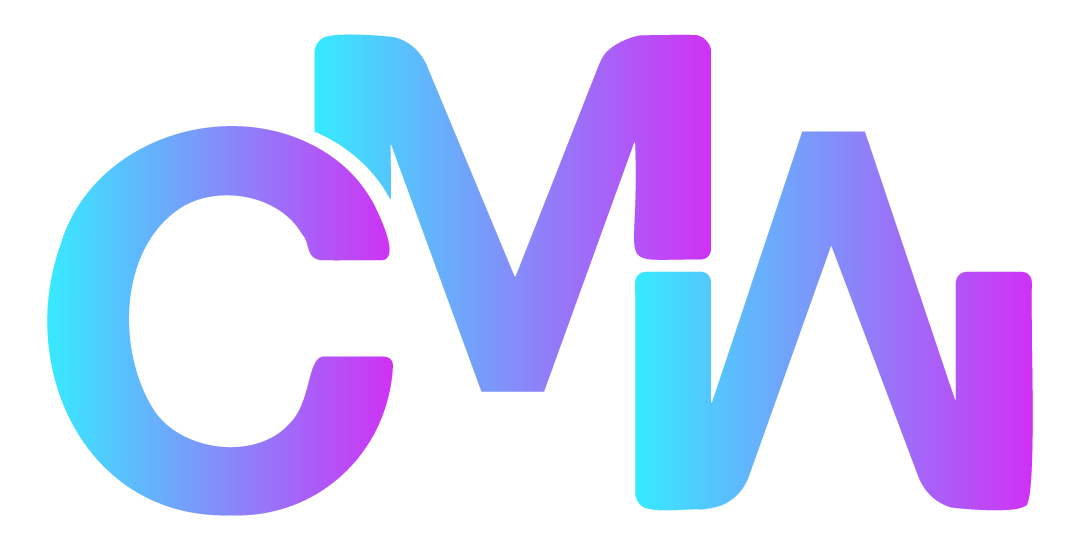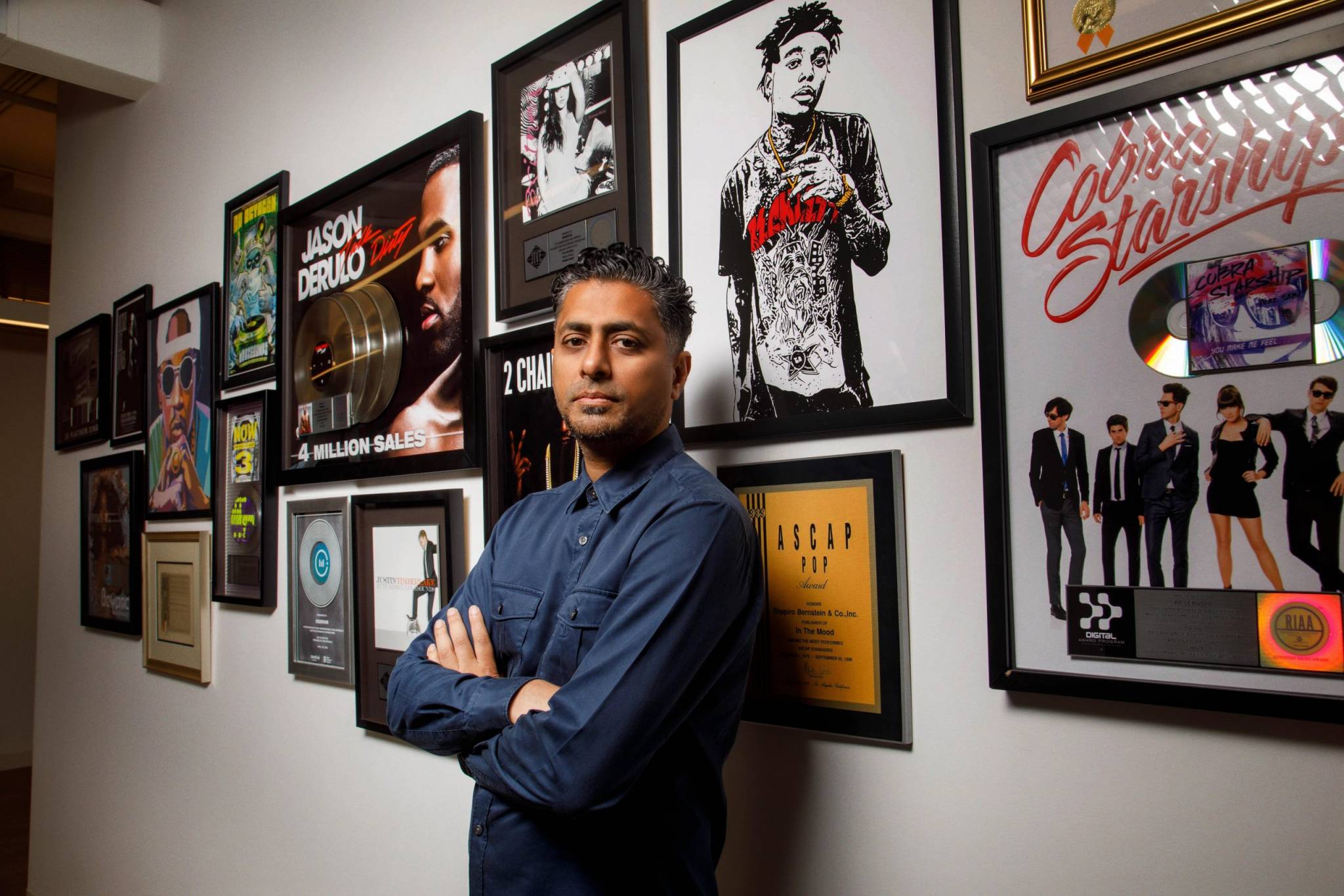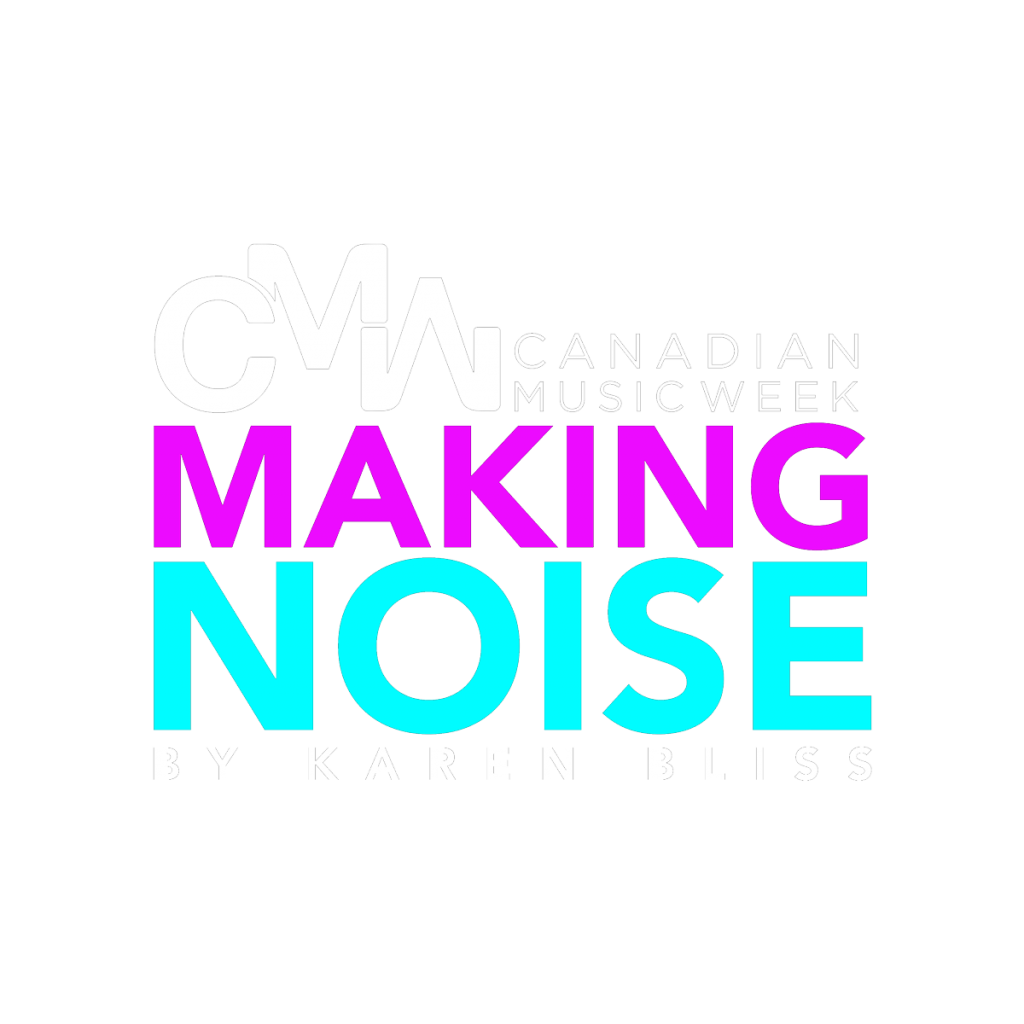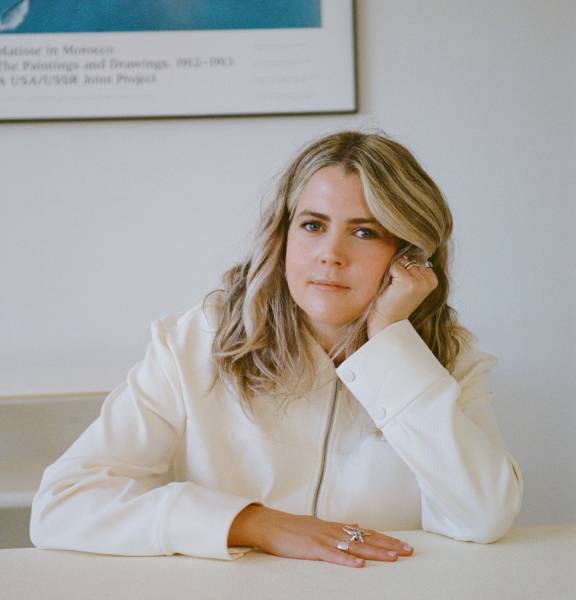BY KAREN BLISS
A Canadian, Hussain Yoosuf, better known as Spek, has made a significant difference in the music scene of United Arab Emirates (UAE). The one-time member of seminal Canadian hip hop group Dream Warriors got his start on the other side of the business working for music publisher olé, before launching his own publishing company and label PopArabia in Abu Dhabi. He was then hired by global independent music publisher Reservoir Media — founded and led by fellow Canadian Golnar Khosrowshahi — where he is now EVP, international and emerging markets.
The Montreal native is currently CEO of PopArabia and its relatively new subsidiary, music rights management company Esmaa, launched in 2020. Both live under Reservoir Media’s group of companies, and are portfolio investments of twofour54, Abu Dhabi Media Zone.
Formed in 2011, PopArabia’s active roster includes Mohamad Ramadan; Bedouin Burger and its member Zeid Hamdan, who releases other collaborative and solo projects; Bashar Murad; ARXP; 7liwa; El Sawareekh; and Ameer Mashour & Mashrex.
Spek also tells Making Noise, “We have one of the largest Arabic music catalogues in the world. In partnership with Reservoir, we have acquired a number of iconic regional music catalogs: Re-Media, including Moseeqa Music and Moseeqa TV), Voice of Beirut, etcetera. So we own catalog by legends in Arabic music like Ziad Rahbani, Dalida, Mohamad Mounir, Amr Diab. Our Arabic catalogue is now over 14,000 songs.”
Last month, Spek joined the Canadian Academy of Recording Arts & Sciences (CARAS)/MusiCounts board of directors.
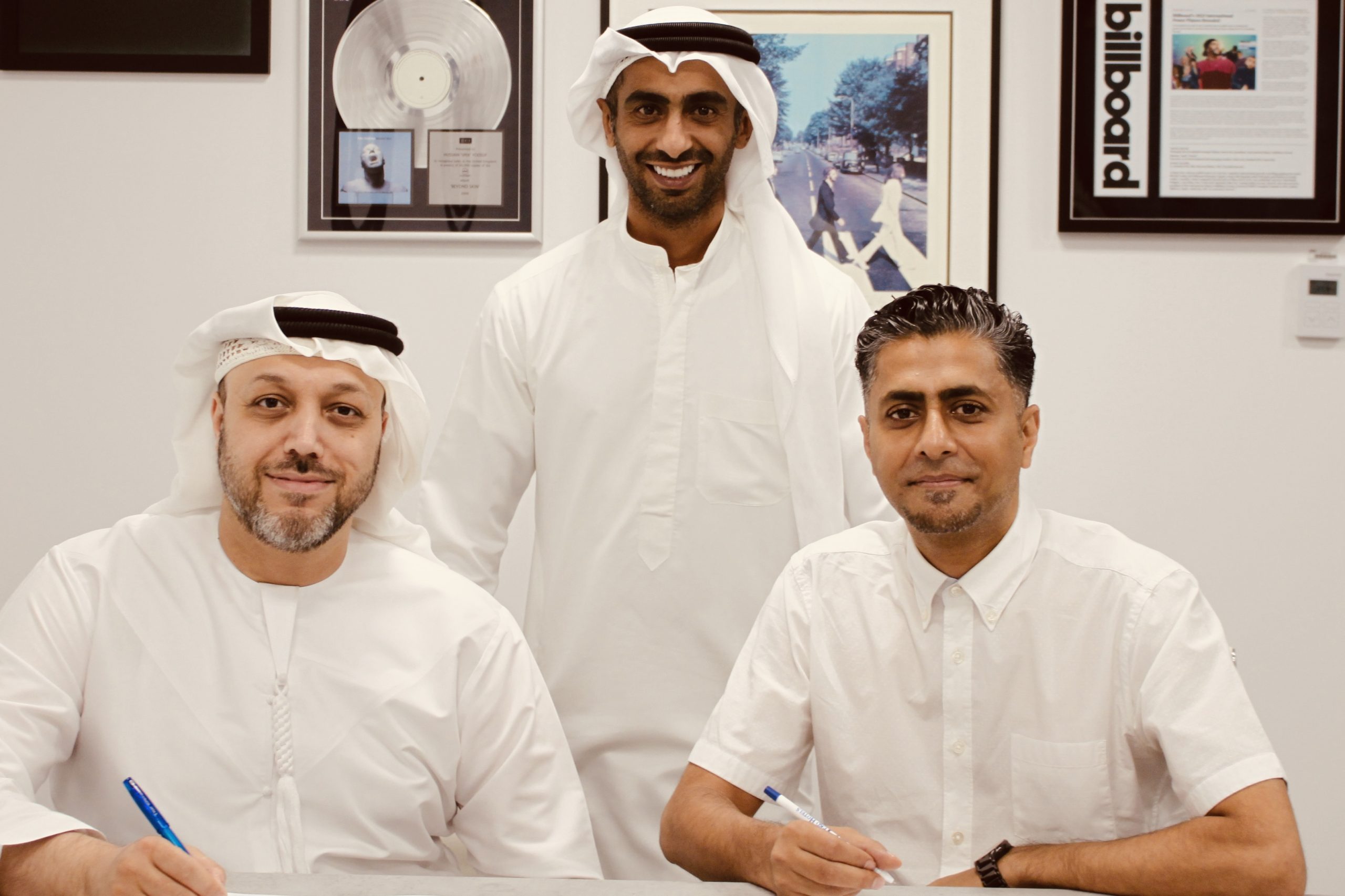
His most recent accomplishment, announced last week, is the signing of a Memorandum of Understanding (MOU) between Esmaa and the brand new Emirati Musicians’ Association (EMA) “to work together in ensuring that the rights of all music creators are comprehensively safeguarded, thereby fostering a more vibrant and sustainable music ecosystem in the region,” according to press release. EMA president Ihab Darwish is also co-managed by PopArabia.
In between his three jobs, Spek is still a creator himself. He recebtly dropped the single “21 Grams,” feat. Kinnie Starr, and will also perform this Friday, Oct. 20, as a guest of Nitin Sawhney at London’s prestigious Royal Albert Hall.
Spek took time out of his travels to speak to Making Noise about setting up shop in the UAE, what the market is like there and what opportunities are there for Canadians.
How did the memorandum of understanding between Esmaa and the Emirati Musicians’ Association come to fruition?
There’s a connection there. First off, the establishing of a musicians association in the UAE is new. To legally create an association is not a straightforward process. So the fact that they created an Emaratii Musicians’ Association is fairly novel and a major step forward for local musicians in the Emirates.
When did that happen?
A few months ago.
They now have to get UAE and other Gulf region musicians signed up.
Yeah, a group of Emirati musicians had been working on this for some time, as I understand it. They created this.
And then you went to them about protecting the creative rights of these musicians?
We knew that this was happening and once they got the trade license to operate as a not-for-profit association, we were in touch with the people who are the board of the association and the founders. The principals of EMA are Emirati musicians who are keen to move the market and eco-system for local music creators forward, a vision we are completely aligned on. So we are working in unison to educate the local music community and collaborate on initiatives relating to the support of music rights and developing an ecosystem that respects the rights of music creators
What are some of the first initiatives you’ll be doing over the next few months?
We are planning a series of music copyright workshops and educational initiatives with other regional partners.
This will be for EMA members?
Yes. The other thing is we’re also working with the Music Publishers Canada (MPC) to plan a Canadian/UAE, MENA [Middle East and North Africa] songwriting camp at the end of next year in the UAE.
Let’s go back in your career. You were ahead of the game in terms of recognizing this area as an emerging market. How a Canadian come to look at this untapped market?
It started for me when I got my first job in publishing. It took me a little while to get my head around the inner workings of music publishing and how royalties, ultimately, would get distributed back to songwriters. It was something that I understood in a very rudimentary way when I was a recording artist. I didn’t fully appreciate how complicated the process was for a songwriter to receive a royalty on the other end of the world from a play that might’ve happened in some other foreign territory. Once I understood how that worked, I became really curious as to how this would work for composers in other markets.
I was living in the U.K. at the time, working for olé [as UK & European representative]. That was my first job in the music publishing space. I would turn on the TV and see Bollywood movies on Vhannel 4 and the BBC every weekend. There are three-hour movies where 60% of the movie has music behind it and I had friends in India I knew weren’t really getting paid. I couldn’t understand where the system was broken and I became curious to find out what was going on that Indian composers weren’t getting paid. So, I convinced my bosses [Roberts Ott and Ivan Berry] to allow me to go out to India in 2005 to see if I could inquire around the acquisition of Bollywood music catalogues, which in 2005 was a novel idea, ad to their credit, they let me go.
So I did that and and met what ended up becoming the first wave of music companies that were fighting for publishing rights in India. Prior to that, the Indian music scene was dominated by Bollywood and Bollywood was dominated by film studios who weren’t necessarily interested in ensuring that composers received their fair share. Bollywood movies, in general, treat composers with buyouts. It wasn’t the norm for a composer to receive an ongoing royalty. And the more I got to know the people on the scene, I felt completely inspired. But I was 18 months into my first job in publishing and I thought to myself, ‘I’m either going to pick up and move to India and compete with these guys who are fighting the good fight, or I’m gonna end up working for them. And I’m not sure I wanna do either.’
On the way back to London, I stopped in the UAE for the first time and I started sort of looking around, and thinking to myself, ‘Wow, I wonder who’s doing what those guys in India are?’ Who’s doing that over here in the Middle East?’ So I took a few days in Dubai and Abu Dhabi and set up meetings with some of the local record companies and broadcasters that I could get a meeting with and started talking to them about music rights, intellectual property, music publishing rights. Everybody looked like I just landed from Mars. They thought what I was talking about was completely farfetched, the idea of respecting copyright. Many of them told me that there was no copyright law in the Middle East.
I looked into it and did my homework and I found that there was a copyright law, but it was new. It was written in 2002. I was visiting in 2005. So everything was brand new at that time.
Were you motivated as an artist to help other artists or was it more from the business perspective?
The driving forces behind what I do today are very clearly rooted in my career as an artist and songwriter.
How did PopArabia start?
I raised investment and launched Pop Arabia as a partnership with twofour54, which is the Abu Dhabi media free zone. It was started as a portfolio business of twofour54 in 2011. Our business was premised on being a sub-publisher to the international community. We very quickly were representing Sony and Universal, and then all the big indies. Over the past 10 years, we’ve represented all of the majors, as well as most of the large indies. That was the business.

How did Reservoir get involved?
I got offered the job in 2015 at Reservoir to head creative and A&R in the U.S. so I moved to New York while I had my team running PopArabia in my absence in the Middle East.
When the streaming services entered the Middle East around 2019, it felt like there was going to be a seachange with respect to an A&R economy around investing in artists, around music rights, in general. And so I went back to Rell [Lafargue, Reservoir COO and president] and Golnar and told them that I felt it was time for me to move back to the region because I felt the future of the music industry was going to be about the emerging markets and they agreed with me. They said, ‘Let’s do it together.’ So they invested at the end of 2019. We announced it in early 2020. So Reservoir became a partner of PopArabia in 2020. That was nine years after I started the business.
You live in Dubai, and your office is in Abu Dhabi. Dubai is an entertainment centre. Lots of expats. No taxes. Lots of disposable income for entertainment. Live Nation launched in Dubai in 2008 [buying a majority stake in local Mirage Promotions, which rebranded]. What type of infrastructure is there for contemporary popular music?
Historically, the music industry in the Middle East, generally, was focused on the live side because if you look at the UAE, for example, it’s a small part of the Middle East but has population of about 10 million people, 90% of which are expats. Those expats have moved over from the U.K. or Europe or Canada or wherever from around the world and they want entertainment. So live shows and artists from the India subcontinent, from around the Arab region or Western artists, have always been coming here and playing big shows. Live Nation has been around for a while and there have been a lot of live concert promoters. That was a big part of the music business historically.
When you look at the wider region, it has a lot of piracy. When it was the CD business, the Middle East wasn’t a market that you thought of as a big market to monetize as a label or a publisher because of the rampant amount of piracy throughout the wider region. But the UAE has always been good at enforcing against piracy, even in those early days. There’s only 10 million people here. There’s about three to 400 million people in the wider region and most of those big populace markets historically had a lot of physical piracy. So the music business was largely live for a long time. That is, until streaming shifted things. That’s where I saw the opportunity.
Abu Dhabi, where you’ve set up your office, was mostly concerned with preserving their arts and culture and put a lot of money into that until recently. Now, there’s a Berklee school and an overall commitment by government on fostering contemporary music and helping create an industry.
Yeah. The way to think about it is Abu Dhabi is DC and Dubai is New York. Dubai is very big on tourism. It’s always been a seaport. It’s always been a trading hub for people coming internationally to trade spices or whatever it might be. There’s always been a big import-export business in Dubai, and they’ve built the tourism infrastructure around that. But 80% of the landmass in the country is Abu Dhabi. So that means all of the oil money is Abu Dhabi. And so Abu Dhabi is is where the federal government effectively operates out of. Abu Dhabi has always taken a long-term view as to its future goals. When I was arriving here in 2006, they were talking about their 2030 and 2040 vision. They always look at things a few decades in the future, and then work diligently to deliver on those objectives. So, yes, arts, culture, entertainment, protection of intellectual property, creating a safe and business-friendly ecosystem to make it easy for people to move here, to set up businesses, and to stay here.
Does the government help fund the arts the way we do in Canada?
In some cases. Twentyfour54, which is the free zone that PopArabia is partnered with, they have something called creative lab, which has dolled out funding grants for arts and creative projects, film projects, music projects, et cetera. So yes, there’s a number of different ways that people can access funding to create stories that reshape the narrative of what it means to be from here or from this region. That’s been a big part of the mission as well. There’s a lot of people with stories to tell. Let’s not be consigned to people in the West telling the narrative of what it means to be an Arab or a Muslim. Let’s tell our own stories and let’s define who we are through that narrative ourselves. So they’ve done a lot of initiatives in that space, which is why we saw them as a really good partner when we set up PopArabia.
You have a roster of talent. You have A&R on your team [Wissam Khodur, VP, A&R & acquisitions; and Nadia Labdar, A&R manager]. Can your artists sustain a career without breaking out of the region because the population is so big?
Yes. It’s a very westernized way of looking at the world — and that’s true of people outside of the West as well — that we need to crack North America or the U.K. in order to be successful. I tell artists all the time, ‘I don’t think that that’s the definition of success.’ That was true when I was growing up as an artist, but I think that it’s the other way around now. We’re going to see Western artists wanting to come to this part of the world to break over here because there’s more people here than there are in North America. And, when you look at the business model of streaming, streaming is based on population sizes. The more people you give away your service to, the more people become premium paying users, and the more paying users you have, the more money you have in the pool to distribute royalties to labels and creators.
Should the crackdown on piracy give Westerners less hesitancy about exploring the market?
Well, it’s already happening. It’s just that we’re at the beginning of a story here but we’ve seen this movie before. Streaming entered the U.S. in 2010 for all intents and purposes and over here, it entered in 2019. So it’s like 2013 over here right now, in terms of the ability to build up a subscriber base. We’re very early in that story, but we are going to get there. What’s different is that the advent of technology has driven new subcultures and new genres to emerge out of each of these markets. And so, there’s something really interesting that’s happening in each of these places where you’re getting new genres that are traveling outside of those countries and becoming really popular throughout the Middle East.
What genres?
In Cairo [Egypt], you’ve got a genre called mahraganat, which we have invested heavily in. You could call it a cousin of rap. It’s Egyptian kids rapping in Arabic over programmed beats, but with Egyptian drums and rhythms. The kids are talking about a lot of the same stuff that they talk about in rap or hip hop. The censorship bureaus in Egypt are trying to ban it, but by doing so they’ve made it even more popular. So every time you see a TikTok video of somebody dancing, going crazy with a belly-dancing sort of vibe, a lot of the time that’s mahraganat and it’s become hugely popular across the region. It’s not just an Egyptian thing anymore. I’ve seen people in China on social media getting down to mahraganat. So we bought what you might call the Def Jam of mahraganat, the original label that first started putting out a lot of the early mahraganat classics. With Reservoir, PopArabia acquired that label [100 Copies] and formed a joint venture with them, and we’ve been putting out new artists together.
Any other new genres of note?
Morocco, you’ve got a version of trap that again uses elements of local music with trap and hip hop. The Saudi hip hop scene is really popping and is creating its own little offshoots. We’re seeing it happen across the region and we’re investing heavily all of these things.
What support is needed to complete the infractructure? Is there an area Canadian companies could fulfil?
Look, there’s infrastructure, but it’s a bit of an imperialist view to think that you need some Western company to come in to help solve the problems. There are local challenges, but the way to solve those local challenges is with local solutions. Part of that means learning from the West, but it also means learning about the East.
What opportunities are Canadian companies perhaps missing?
There’s a real cross-cultural connection between Asia, Africa, the Middle East and Canada, just by virtue of the second gen and third gen kids that are growing up in Canada. There’s certainly a lot of artists that got their swag from growing up in Toronto or Vancouver or Montreal, but the music that they do is heavily influenced by the culture that they grew up around, which might have come from Lebanon or Sudan or Egypt or whathaveyou. So there’s a real opportunity to bridge the gap between those two worlds.
We’re starting to see it with artists that are blowing up in the region and or in Canada. I think [Morocco-born, Winnipeg-based singer] Faouzia is really interesting and if you look at what’s going on in India as well, some of the artists like AP Dhillon and Tesher are Canadian artists that are huge. So we’re seeing it happen already. The reality is that the future of pop music is going to be defined by cross-cultural, multilanguage, multiethnic music in a way that wasn’t the case in previous eras. So there’s going to be a lot of opportunity for Canadian music companies to think about what is possible for their artists outside of just the Canadian market, to see the full breadth of opportunity for Canadian artists to be in the global market.

The artists you’ve signed, where has your A&R team discovered them, traditional avenues like clubs or new ones like TikTok?
We know the people on the scene because there’s a big independent movement for independent artists out here, as there is everywhere, as a result of the technology and the platforms. So we’re discovering music like anybody else’s. But, one of the things that we did was acquire the catalogue of iconic Lebanese producer Zeid Hamdan. And then as we were doing that deal, I was asking him what he was working on, and he said, ‘I’ve got this new band called Bedouin Burger, and I want to put out an album.’ So we said, ‘Okay, let us be your label and publisher partner for that as well.’ So, we invested in Bedouin Burger, and it’s been a really exciting project. The best way I can describe it is Arabic trip hop. They have just done [NPR’s] Tiny Desk [concert performance]. They’ve toured the U.S. a few times; they’ve toured Europe; they toured the Middle East. It’s a beautiful album. So we discovered that just through the relationship with Zeid. We also signed Mohamad Ramadan to a publishing deal. He is one of the superstars of the region. He’s got over 6 billion streams on YouTube. It’s hard to miss him, being as big as he is. So we’ve been doing a combination of small developing things, as well as going after some of the bigger acts.
How is it going with your newer company, Esmaa, which launched in 2020?
What we’ve done with Esma is the biggest challenge over here, as you’ve alluded to, is that there’s historically been a lack of infrastructure around the enforcement of rights in the music industry. So when you’re talking about the live business, it’s always been a pretty good business because they pay a lot of money to get somebody like Ed Sheeran to come and play a concert, but bringing superstar Western acts to come in and play in your city doesn’t develop a local scene. And the only way to really develop a local scene so that you have a vibrant cultural identity is to invest in the development of local music and local artists. It’s very difficult to do that if artists don’t have a way to make money from their music being played or used in any way.
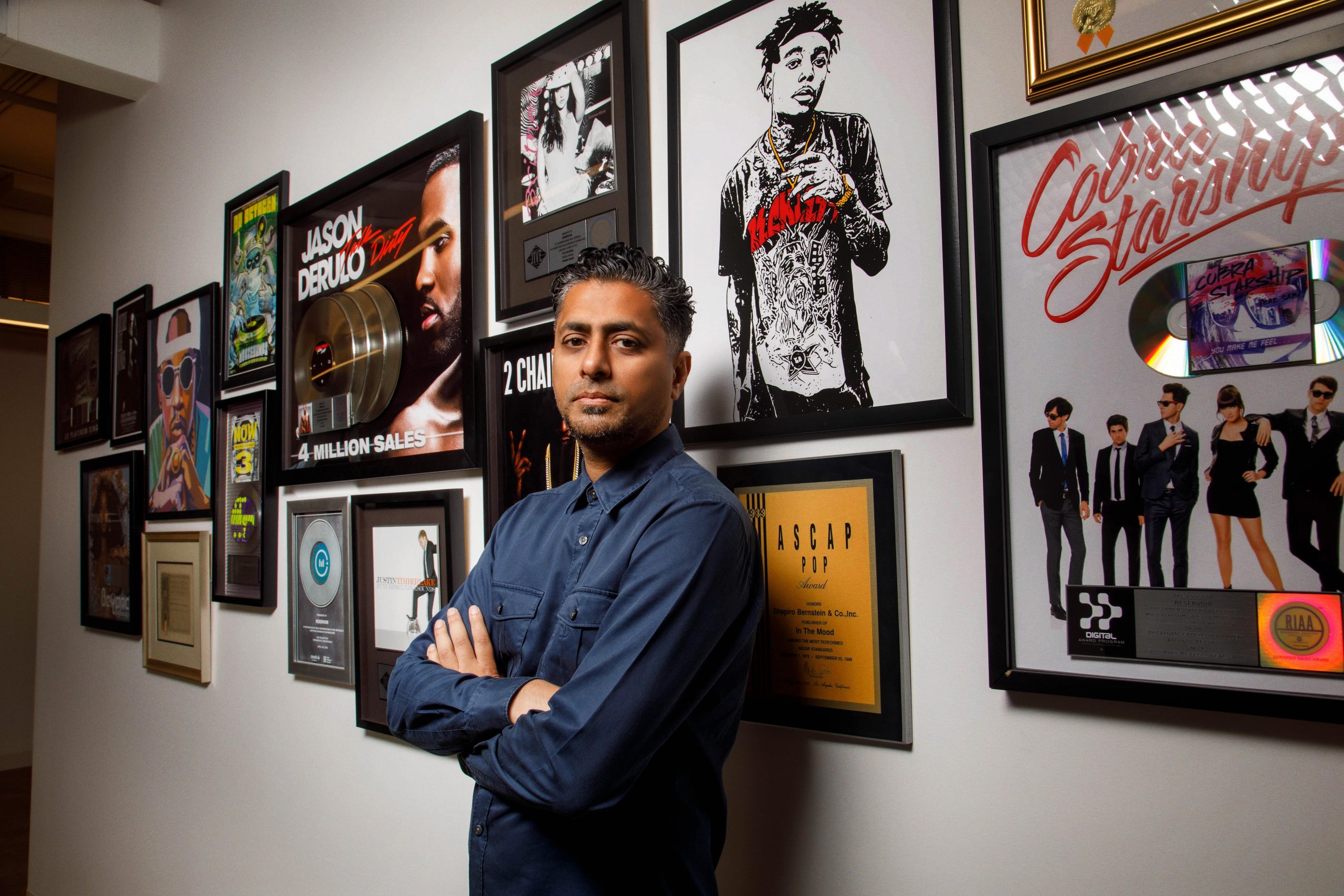
And we’re really proud of the work that we’ve done with Esmaa, where we effectively set up the first rights organization in the history of the Gulf [and only member of the International Confederation of Societies of Authors and Composers – CISAC]. We went out and did a lot of the hard work to represent PROs around the world, like [Canada’s] SOCAN and [Britain’s] PRS, and we’ve licensed major global events here [DubaiEXPO, Soundstorm in Saudi Arabia] and distributed millions of dollars in royalties to rights holders, which is something that we can fairly say has never been done before.
Yes, PopArabia is a publisher and a label, and we’re excited about the music scene in this region. But we’re equally excited about the work that we’re doing at Esma to try and bring about the culture for the respect for music, rights for music artists, and create and cultivate an ecosystem where artists can thrive, which goes far beyond just being a label and a publisher.
What markets do you look at specifically for Reservoir, as EVP of international and emerging markets?
I signed Divine in India, who’s the biggest hip hop artist in India. We looked to Africa, as we look to China, as we look to India and other emerging markets, I’m doing what I can to further the Reservoir mission so that we can develop things like we’ve done in the Middle East with PopArabia and Esmaa.

Lastly, and slightly off topic, this year marks the 50th anniversary of hip hop. We were behind in Canada, but Dream Warriors was hugely significant in the birth and growth of hip hop. What are your reflections on that first wave in the 90s?
I feel fortunate to have been at the first wave of Canadian hip hop, as it was happening. I worked with Michie Mee, worked with the Dream Warriors. I put out my own solo projects as well. A lot of the things that we were fighting for in terms of validation by the industry itself were things that we really fought for. And, 20 years later, we see all of the things that we fought for having come to fruition in terms of a recognized acceptance, not just in Canada, but globally for the music that we’re making.
So I’m very proud of my role in being amongst that first wave. Those experiences, fighting for that validation, for that recognition for the genre itself, reminds me a lot of what I see in all of the emerging markets with the local independent music scenes that are cropping up these days. I see a lot of parallels to that experience now starting to take shape in a lot of these markets. I feel like all of those experiences I had in Canada helped me to have a better understanding of what I see happening in emerging markets today. I still make music. I’m performing at Royal Albert Hall on Friday [Oct. 20] with Nitin Sawhney, which is a treat.
